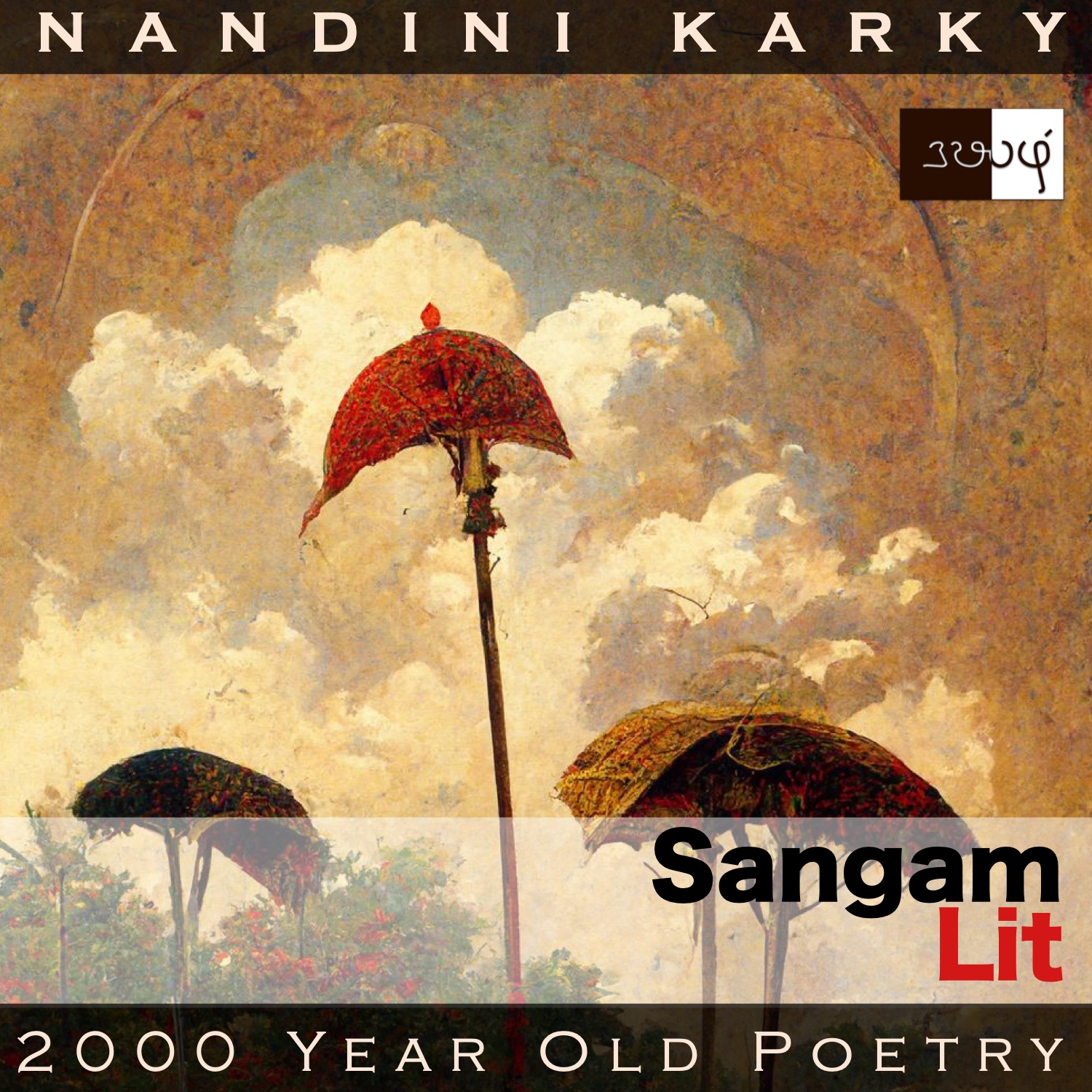Podcast: Play in new window | Download
Subscribe: Apple Podcasts | Spotify | Amazon Music | Android | iHeartRadio | Email | TuneIn | RSS | More

In this episode, we perceive a king’s capabilities in the battlefield as depicted in Sangam Literary work, Puranaanooru 31, penned about the Chozha King Nalankilli, by the poet Kovoor Kizhaar. Set in the category of ‘Vaagai Thinai’ or ‘King’s victory’, the verse speaks about the consequences of the king’s prowess in war.
சிறப்புடை மரபின் பொருளும் இன்பமும்
அறத்து வழிப்படூஉம் தோற்றம் போல,
இரு குடை பின்பட ஓங்கிய ஒரு குடை,
உரு கெழு மதியின், நிவந்து, சேண் விளங்க,
நல் இசை வேட்டம் வேண்டி, வெல் போர்ப்
பாசறை அல்லது நீ ஒல்லாயே;
நுதிமுகம் மழுங்க மண்டி, ஒன்னார்
கடி மதில் பாயும் நின் களிறு அடங்கலவே;
‘போர்’ எனின், புகலும் புனை கழல் மறவர்,
‘காடு இடைக் கிடந்த நாடு நனி சேஎய;
செல்வேம் அல்லேம்’ என்னார்; ‘கல்லென்
விழவுடை ஆங்கண் வேற்றுப் புலத்து இறுத்து,
குண கடல் பின்னது ஆக, குட கடல்
வெண் தலைப் புணரி நின் மான் குளம்பு அலைப்ப,
வல முறை வருதலும் உண்டு’ என்று அலமந்து,
நெஞ்சு நடுங்கு அவலம் பாய,
துஞ்சாக் கண்ண, வட புலத்து அரசே.
Another song celebrating the Chozha king Nalankilli, this time by a different poet. The poet’s words can be translated as follows:
“As per the excellent custom of wealth and pleasure following in the footsteps of righteousness, appears one soaring umbrella followed meekly by two others, akin to a fully formed white moon, high above, spreading its light far and wide.
Wishing to attain fame, you seem not to agree to be at any place other than the victorious battle encampments. Dashing against with such force, making their sharp tusks blunt, your elephants pounce onto fort walls of enemy kings without control;
When they hear the battle cry, those soldiers with well-etched warrior anklets rise up with eagerness. Never do they say, ‘Those lands are far away interspersed with drylands forests. So, we shan’t go!’
Others say, ‘he lays siege to those faraway lands that resound with sounds of festivities, as the eastern sea is found in the rear and white-headed waves of the western sea splash against the hooves of his horses. He might even encircle the land’. And thus, you spread a dreaded fear that makes their hearts shiver and leaves those kings in the North with sleepless eyes.”
Let’s get to know this king better by delving into these words. The poet starts by bringing to fore the three cornerstones of Tamil philosophy – prosperity, pleasure and principles, and portrays how principles precedes the other two. Justice is more important than materialism or seeking joy, the poet implies. This abstract assembly is called in parallel to how one umbrella precedes in prominence and height over two other umbrellas and this leading umbrella seems to shower light upon the land like the moon on high. The image of these three umbrellas is a metaphor for how the reign of this Chozha king is superior to that of both the Pandya and Chera kings, possibly implying that this Chozha king has won over both the contemporary monarchs to the East and the South.
Next, the poet talks about how the king seems not to want the comforts of a palace life but prefers battle camps where he lands many a victory. From there, the focus shifts to elephants in the king’s army that batters the enemy’s fort walls without a thought about their tusks. Following this, the thought process of the king’s soldiers is presented saying they delight at the mention of war and never fear to travel to enemy lands, no matter the distance or danger in between.
From the thoughts of the king’s warriors, the poet moves the spotlight to the minds of some others. Who they are, we’ll find out shortly. These people seem to be mulling over how this king has swept across the land between the eastern and western seas and tremble with fear thinking, he might go on to subdue the earth entire. These shivering kings are none other than the kings in the North, who now toss and turn with sleepless eyes in trepidation of this Chozha king, the poet concludes.
To me, it was interesting to note how this poet puts down other kings so as to praise this particular patron. Perhaps he visits not the courts of the Chera or Pandya rulers, for here he seems to suggest that they are next to the Chozha king in fame and worthiness. Similarly, the kings in the North are also presented without the courage to face the fury of this Chozha king. It pleases the king being praised no doubt but is it the righteous way to render appreciation? To compare and put down, seems to come so easily to us humans and it’s something that we need to be vigilant about and keep at bay, supposedly like those sleepless kings in the North!




Share your thoughts...